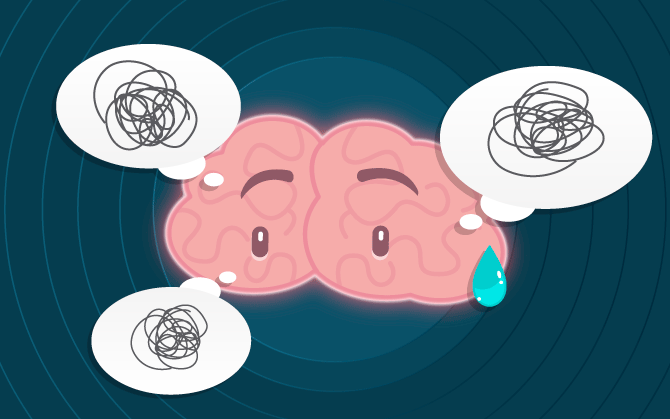
What will we see in this post
We live in a world that demands immediate results, where information flows like an overwhelming stream.
This scenario is the cause of major technological and social advances, but at the same time, the constant flow of data and information has begun to develop worrying mental health conditions in the population, especially in the workplace.
Who has never felt that bad feeling like having butterflies in your belly and rapid heartbeat when facing a tight deadline, a stressful situation or even a bad relationship with colleagues?
Anxiety at work can lead to much more serious conditions, damaging your mental health.
With this in mind, we bring you 9 tips in this article that can help you control anxiety at work. Keep reading!
Understand the causes of anxiety at work and in life
We still do not know for sure why some people are more likely to develop uncontrolled anxiety than others.
However, some health conditions can lead to the development of depression, such as:
- genetic predisposition and family history of anxiety attacks;
- recurrent trauma or stress in daily life;
- negative mindsets, which lead to bad thoughts about oneself, arising from an unstable psychological condition;
- physical illness or trauma.
In the workplace, some situations, attitudes, and behaviors can lead to anxiety. Most corporate environments are, of course, stressful and unfriendly to people.
According to a survey conducted in more than 10 countries by the Robert Half institute, which specializes in recruiting and selecting people, excess of tasks per employee and lack of leadership recognition are major causes of stress and anxiety among workers.
Those who feel overwhelmed, and overworked, end up becoming anxious about not being able to meet deadlines, and naturally worry about too many tasks.
This type of situation is responsible for developing feelings of fear, insecurity and distress, as these people tend to fear being fired.
Those employees who feel undervalued by their own company also develop anxiety, as they often experience apprehension, low self-esteem and a lack of motivation.
In general, other factors that can trigger anxiety at work are:
- excessive worrying;
- excessive responsibility;
- short and inadequate deadlines;
- unattainable goals;
- unending quests for results.
Know what the symptoms of anxiety at work are
It is often not difficult to identify someone anxious at work, especially when this type of situation interferes with their productivity.
These people often show compulsive behaviors such as constantly updating corporate aking hands, having trouble communicating at important meetings, emails, shand more.
Learn 9 Ways to Deal With Anxiety at Work
Ideally, the best way to solve a problem that is causing an anxiety condition is to identify the source and nip it in the bud.
However, in the workplace this can mean a direct confrontation with your boss, which is not always an option.
Therefore, often the best way to deal with this anxiety situation is to work on your own feelings internally, seeking to remedy the damage and to strengthen yourself so that new crises cannot happen again.
With that in mind, here are 9 ways to deal with work anxiety that can help you get around this.
First of all, we emphasize that the best attitude is to always seek guidance from a psychologist, as they are prepared to help you properly take care of your mental health.
1. Identify the source of your problem
The first step in solving your anxiety is to find out why it exists. Analyze your habits, attitudes and work environment well. What recently changed that made your anxiety soar?
Also try to analyze your own behavior. It is possible that your concern about short deadlines is actually a symptom of your own procrastination, which must be solved to eliminate anxiety.
2. Accept your negative thinking.
Have you heard that a person with a drug addiction —whether legal or illegal — must recognize, first and foremost, that they are ill and addicted to drugs?
For anxiety, things work much the same way. It is crucial that at first you recognize how irrational your thoughts are.
While our minds are extremely creative in raising concerns in our heads, they are also the solution to such problems.
Just organize your thoughts and do some exercises, such as constantly repeating your problem out loud until the very sound of the words become meaningless.
3. Organize your environment
There are few things more exhausting than a disorganized environment where objects get lost and out of place. One of the causes of anxiety for many people is precisely a lack of organization of the work area itself.
Therefore, it is essential to do everything possible to keep your own environment organized, setting your table and creating a harmonious, cozy space that encourages the creation of new ideas.
Remember that digital media, such as folders on your computer, must also be kept organized, mainly because it is in this virtual environment that most people perform their tasks.
This allows you to find files, information and documents faster, making your work easier and avoiding further anxiety attacks.
4. Set your priorities
With the problem identified and the environment organized, it’s time for action. To do so, it is essential that you make a priority list and be guided by it.
If you’re the kind of person who gets lost when faced with a large number of tasks, setting priorities is a great way to align personal goals and start solving problems.
For those who often need to launch digital products, for example, organizing a priority order list is the best way to meet deadlines without being anxious or afraid of being unable to meet demands.
Even those who consider themselves to be multitaskers need to define what is a priority and what can be done last, thus organizing an efficient work routine.
5. Breathe and take breaks
If the tasks are demanding too much of you, do not leave things to chance. Take a moment, breathe and stay calm. Rest is part of any activity and is critical to maintaining a high level of productivity.
If work is really tiring your mind, take a few minutes and go to the kitchen to grab a cup of coffee, pump blood to your legs and have a chat with your colleagues. Get out of the environment where you work and give your mind room to breathe.
If the situation is even worse, sit in a calm, well-ventilated place and take a deep breath through your mouth, with your eyes closed, and count to 5. Hold the air, feel your lungs full, then exhale counting to 10.
Repeat the procedure five more times and you will feel much more relaxed with the anxiety crisis under control.
6. Decide and do not postpone
An anxiety and chronic stress condition makes it difficult for people to make decisions. A good way to avoid this is to decide what you are going to do next and get the job done at once.
In doing so, you avoid procrastination and as a bonus you catch up on your duties faster, making time to take care of yourself, either by exercising or simply resting.
7. Think positive
There is nothing that attracts more bad feelings than negative thinking. It may sound cliché or cheesy, but thinking positively makes a big difference.
Even if this attitude does not produce immediate and tangible results, you will realize how much it helps in your state of mind.
A person with a positive attitude avoids bouts of anxiety at work and as a bonus this affects their colleagues, making the environment relaxed and more pleasant.
8. Change your habits
When a habit is not good for us, it is actually an addiction. And even the ones that are part of our routine, while doing no harm, in the long run, can undermine us.
Who has ever felt that they could not advance their career and was always doing the same things?
A simple change of habits, introducing new activities into the routine, gives us a breath of fresh air in our lives, causing the feeling that things are changing, even on a small scale.
9. Focus
When we have difficulty focusing our attention on what needs to be done, we end up generating a feeling of anxiety – and anxiety at work is a huge enemy of productivity.
So when the crisis starts, try to focus. Close your eyes, block out all the sounds around you, and focus on what comes next. If necessary, make a handwritten checklist. This way you can take the reins of the situation, avoiding the onset of anxiety.
The danger of anxiety at work
Anxiety attacks are no joke. They can lead to extremely serious situations such as a depressive condition and panic syndrome.
It is therefore essential that if you are feeling helpless, seek the help of a specialist.
Anxiety at work, when it reaches its limit, can lead anyone to burnout.
Want to know more about this problem? Then check out our article where we explain everything about Burnout Syndrome!





